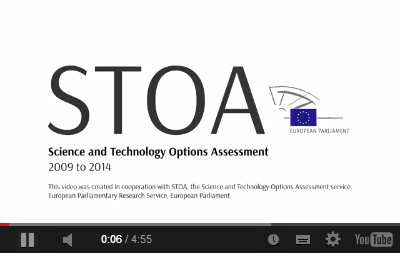STOA is the Science and Technology Options Assessment body, established in 1987 and now part of the European Parliament Research Services Directorate General. STOA provides Members and Committees of the European Parliament with independent, science-based evidence for policy making.
It carries out projects to assess the impact of introducing or promoting new technologies and the best policy options from a scientific and technological perspective, securing advice from external independent experts. STOA is joined by EPTA, a network of bodies throughout Europe that provide their parliaments with independent technology assessment and scientific advice.
STOA aims to bridge the gap between policy makers and the scientific community.
The STOA Panel is a body of 15 MEPs who are politically responsible for STOA. At their monthly meeting in Strasbourg, Members discuss on-going and future projects and workshops; interim and final outcomes of studies; and topics that may be of interest for STOA by organisations like the European Commission, science and research institutes, and other stakeholders. The STOA Bureau oversees STOA’s activities and prepares the panel meetings.
During the seventh legislature from 2009 to 2014, STOA produced 24 projects, across 5 broad domains:
- Eco-efficient transport and modern energy solutions
- Sustainable management of natural resources
- Security of the internet
- Health and technology in the life sciences
- Science, technology and innovation policy.
The outputs of these projects are studies and workshops. A full study is about 100 pages long. A four-page options brief evaluates policy options. 20-page layman’s summaries take a look at project findings for non-specialists. All reports are available for both MEPs and the wider public to download from our website.
The interim and final outcomes of projects are routinely presented to committees during their regular meetings – notably:
- Plant breeding and innovative agriculture
- Cutting food waste
- Sustainable management of natural resources.
Workshops held while projects are still on-going allow the discussion and possible amendment of interim findings. The final results are presented later. STOA also organises ad hoc workshops for science and technology subjects that emerge as politically relevant.
In November 2013, STOA hosted an ad hoc workshop to facilitate a dialogue between MEPs and the authors of the IPCC report into the physical basis for climate change.
STOA also holds a prestigious annual lecture, allowing scientists and experts at the very top of their fields to talk to an audience of MEPs and the wider public.
Further links are encouraged between scientists and MEPs through visits to scientific institutes and science and technology forums alongside a scheme pairing MEPs with European scientists. This scheme enables the development of mutual understanding and lasting relationships. As a follow-up to their pairing, Ioannis Tsoukalas MEP and Professor Angelo Cangelosi of the University of Plymouth, UK, hosted a lunch debate – and demonstration – on robotics.
All of this is how STOA connects MEPs with high-profile scientists and experts, allowing a solid scientific evidence base to underpin policy making.








Be the first to write a comment.